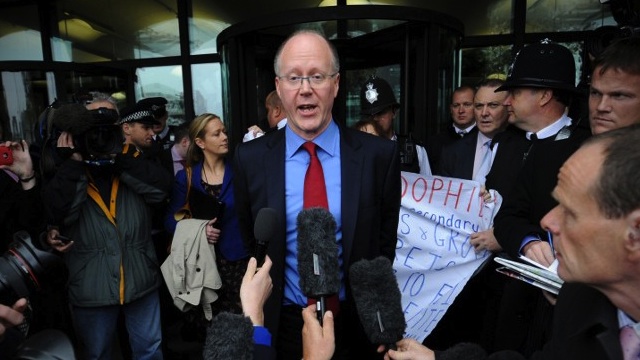SUMMARY
This is AI generated summarization, which may have errors. For context, always refer to the full article.

LONDON, United Kingdom (UPDATED) – The head of the BBC dramatically resigned on Saturday, November 10, just two months into the job, after the public broadcaster’s flagship news show wrongly implicated a British politician in child sex abuse.
George Entwistle’s departure plunges the BBC into fresh crisis as it battles to defend its reputation in the wake of the scandal surrounding the late Jimmy Savile, a one-time BBC star now alleged to have been a serial sex offender.
“The wholly exceptional events of the past few weeks have led me to conclude that the BBC should appoint a new leader,” Entwistle said in a televised statement outside the broadcaster’s London headquarters.
“To have been the director-general of the BBC even for a short period, and in the most challenging of circumstances, has been a great honor.”
Entwistle, 50, announced his resignation the day after the BBC’s flagship news program Newsnight was forced to apologize for wrongly implicating a senior Conservative party figure in abuse at a Welsh children’s home in the 1970s.
The director-general said he had not been aware of last week’s Newsnight report before it went out, but said quitting was “the honorable thing to do” since he was also editor-in-chief, and ultimately responsible for all BBC output.
Tim Davie, who is currently the BBC’s director of audio and music, will take over immediately as acting director-general.
Earlier on Saturday, Entwistle had said it was “fundamentally wrong” of Newsnight to air an interview with a man claiming he was repeatedly abused at a children’s home in the 1970s by a senior Conservative politician.
The program did not identify the politician, but he was widely named on the Internet as former Tory party treasurer Alistair McAlpine, a former aide to Margaret Thatcher.
McAlpine went public on Friday to strongly deny the allegations, and hours later his accuser Steve Messham retracted his claims, saying he had only just seen a picture of McAlpine and he was not the man who had abused him.
Entwistle, who first joined the BBC in 1989, was only installed as its director-general in September and had spent his short time at the top dealing with the fall-out from the Savile scandal.
Both Newsnight and Entwistle have come under scrutiny after it emerged that the program had last year dropped an investigation into the Savile abuse claims .
Entwistle, who edited Newsnight himself a decade ago, admitted in an interview with BBC radio earlier on Saturday that the corporation faced a “crisis of trust”.
Chris Patten, the chairman of the broadcaster’s governing body, the BBC Trust, said it was “one of the saddest evenings of my public life”.
Standing alongside Entwistle as he made his resignation statement, the former Hong Kong governor said: “At the heart of the BBC is its role as a trusted global news organization.
“As the editor-in-chief of that news organization George has very honorably offered us his resignation because of the unacceptable mistakes — the unacceptable shoddy journalism — which has caused us so much controversy.
“He has behaved as editor with huge honor and courage and would that the rest of the world always behaved the same.”
Culture minister Maria Miller welcomed Entwistle’s decision to quit.
“It is a regrettable but the right decision,” she said. “It is vital that credibility and public trust in this important national institution is restored.”
Lawyers for McAlpine have said they will pursue legal action against “all media who have defamed Lord McAlpine’s reputation and published defamatory statements”.
The politician, who blasted the claims as “wholly false and seriously defamatory”, said he was forced to publicly deny them after he was named directly on the Internet and “by innuendo” in the print and broadcast media. – Katy Lee, Agence France-Presse
Add a comment
How does this make you feel?
There are no comments yet. Add your comment to start the conversation.